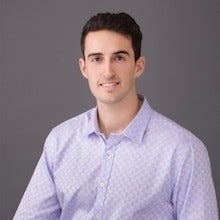Q: What attracted you to the MEECON program?
A: I really liked the idea of being in the energy capital of the country. I knew Rice, and specifically the Baker institute, was and still is the place to get an education in energy, so naturally I wanted to be a part of it. In addition, I was coming from an engineering background, so I wanted something that was technical, but still had coursework on things like geopolitics and policy so that I could be more well-rounded; looking at the curriculum it seemed diverse enough to really provide that kind of holistic education, and it definitely delivered.
Q: What was your career like prior to the program?
A: I was one of the few people in the program with minimal work experience. I had some internship experience at a few different places, but was ultimately a new grad. As a necessary follow-up, I definitely felt like only being a few years removed from Statistics and Calculus set me up well; the MEECON degree requires a rudimentary understanding of those topics (they will teach you what you need to know), so being right out of school helped. If you do need additional assistance, everyone in the program was super helpful when it came to their domain of expertise, and the TAs were incredible.
Q: Where are you now in your working life and what do you do?
A: Currently I work as a data scientist for a small consulting firm in California. As I mentioned earlier, I had very little work experience, so I’m still early in my career. I help companies gather insights from their data, and perform statistical analysis and machine learning to test hypotheses and determine if underlying patterns exist; I learned the machine learning outside of class, however a lot of the data analysis will be taught in econometrics. Oil being down when I graduated, paired with me having a programming background from high school and college, made California tech a lucrative option.I think it’s more reasonable to end up in somewhere like Houston, DC, or another energy hub, as that’s where the jobs will be for most Meecon grads. All that said, I would like nothing more than to end up in the energy sector once I’ve built out my toolbox of skills; the program really instils a love and appreciation for the industry.
Q: What was the highlight/most memorable moment of your experience in the MEECON program?
A: I don’t think this question is fair, because everyday something memorable happened. Being introduced to such a complex and fascinating industry by professors who are experts in the field is hard to beat, but I think I’m going to have to give it up to my classmates. Coming out of my bachelor’s, I was an excellent student, however Meecon made me into an excellent person. Being thrown into a classroom with 25 people who all have different backgrounds, levels of experience, and cultural background was nothing short of a shock to me. I think you could ask anyone in my class and they’d tell you I knew my stuff, but I was easily frustrated, and at times impatient. As the program progressed, I learned that we all have strengths and weaknesses that when combined, are greater than the sum of their parts. This is an excellent analogy for the energy industry: different cultures, different teams, different domains of expertise, all working together to keep the lights on.
Q: What was your favorite class in the MEECON program?
A: This is tough. Dr. Medlock’s classes will make you think like an energy economist, so pay attention, but I think Econometrics is my #1. It was by far the hardest class to grasp. Learning R while also learning econometrics, all in one class… wow. That said, I think it was invaluable. Even if you walk away only learning the basics, those are going to help you understand a lot about how valuable data can be when solving problems. I would recommend learning R and brushing up on statistics before this class, so that you're able to focus on the concepts without having to struggle with learning to program in R.
Q: What would you say to someone who is considering leaving their job for about one year to pursue a professional master's program?
A: Whether you have a ton of experience in energy or elsewhere, or are fresh out of school, you will learn a lot. Not only will you become a master of geopolitics and macroeconomic trends, but you will also be able to talk shop with the technical side of the industry too. I learned as much about geology and engineering as I did about trade wars and demand curves, and I think that’s hard to beat. Beyond that, you will gain a network of professors, economists, and more importantly peers. We are all doing well, and it’s always a highlight of my day seeing job updates from people in the program.

